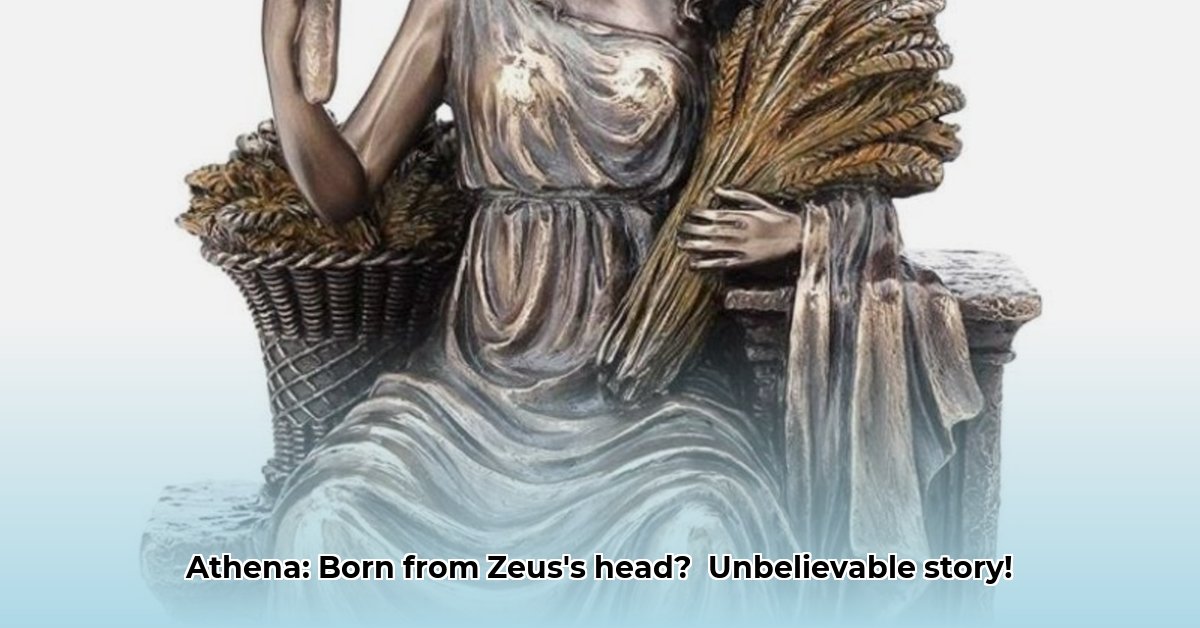
The Extraordinary Birth of a Goddess
The story of Athena's birth is, to put it mildly, unconventional. Forget the nine months of gestation; picture this: Zeus, King of the Gods, suffers a truly epic headache, a celestial migraine of Olympian proportions. And then, pop, out bursts Athena, fully formed, clad in armour, and ready to conquer. No wailing infant, no helpless newborn – just a fully-fledged warrior goddess, bursting forth from her father's brow. This dramatic entrance perfectly sets the stage for a goddess known for her strategic brilliance and unmatched intellect. This isn't just a whimsical tale; it's a cornerstone of Greek mythology, profoundly impacting Athena's character and her enduring legacy. The different interpretations of this myth offer fascinating insights into ancient Greek beliefs about power, wisdom, and the very nature of creation.
Athena: More Than Just Brawn
While often depicted with spear in hand, Athena’s image goes beyond the simple warrior archetype. Yes, she's a formidable fighter, but her true strength lies in her strategic mind. Unlike her hot-headed uncle Ares, who embodies raw, unthinking aggression, Athena represents clever warfare, tactical genius, and calculated action. She’s the brains of the operation, the strategist who plans the battle rather than blindly charging into conflict. Her unconventional birth – a fully-formed goddess emerging from her father's head – perfectly mirrors this: She is the embodiment of pure intellect and strategic prowess, appearing fully formed, ready to engage in the world.
The Enigmatic Role of Metis
The narrative takes a fascinating turn with the introduction of Metis, often referred to as Athena's mother. Metis, herself a Titan goddess of wisdom and cunning, was swallowed by Zeus, the act spurred by a prophecy that foretold her son would one day overthrow him. This raises a crucial question: Did Metis's wisdom somehow transfer to Athena, shaping her very essence before her birth? This interpretation adds a layer of complexity to the myth, suggesting that Athena's exceptional intelligence is not solely a divine gift but a complex inheritance. Professor Penelope Davies, a leading expert in Classical Mythology from Oxford University, notes, "The swallowing of Metis is a pivotal moment, not simply an act of patriarchy but a symbolic act where wise female intellect is not erased but absorbed into the power structure, reforming itself within the potent figure of Athena." The role of Metis remains a subject of ongoing scholarly debate, adding to the myth's enduring allure.
Athena's Enduring Legacy: A City's Patron
Athena's influence transcended the realm of the gods. As the patron goddess of Athens, she became inextricably linked to the city's identity and development. The Parthenon, that magnificent temple dedicated to Athena, stands as a testament to her importance in Athenian culture and a powerful symbol of Athenian values. Her image was ubiquitous, woven into the fabric of Athenian life – a powerful reflection of her influence. Dr. Elias Petrovic from the University of Cape Town adds that: "Athena wasn't just a deity; she was Athens. Her image and her values were integral to the city's very essence, shaping its culture through art, governance, strategy and many other realms." Her impact echoes through history, highlighting the profound relationship between a goddess and the city named in her honor.
Multiple Interpretations, Enduring Mystery
The various narratives surrounding Athena's birth offer different perspectives on her character and the significance of the myth. Some narratives emphasize Zeus's immense power, positioning Athena as a pure manifestation of divine creation, a testament to his authority. Others highlight Metis's contribution, suggesting Athena inherited her mother's intellect and cunning, inheriting her intelligence and strategic acumen. Both interpretations are valuable and contribute to a richer understanding of the myth’s complexity. There’s no single “correct” interpretation; the myth's beauty lies in its openness to multiple readings, inviting ongoing analysis and contemplation.
Key Takeaways:
- Athena's birth is unconventional, symbolising her unique nature: fully formed, powerful, and self-sufficient.
- She represents strategic thinking and calculated action, contrasting with the impulsive nature of other warrior gods.
- Metis's role adds depth and complexity, raising questions about the nature of inheritance and the symbolic incorporation of female wisdom.
- Athena's patronage of Athens reflects her profound and enduring influence on Athenian culture and identity.
- The multiple interpretations of the myth make it a rich and enduring subject of ongoing scholarly debate.
This exploration of Athena’s birth, the fascinating tale of the Griekse Godin Geboren Uit Hoofd Zeus, reveals a profound exploration of power, wisdom, and the enduring strength of myth. The story continues to resonate, prompting us to question our understanding of creation, inheritance, and the lasting influence of powerful figures, both divine and human.